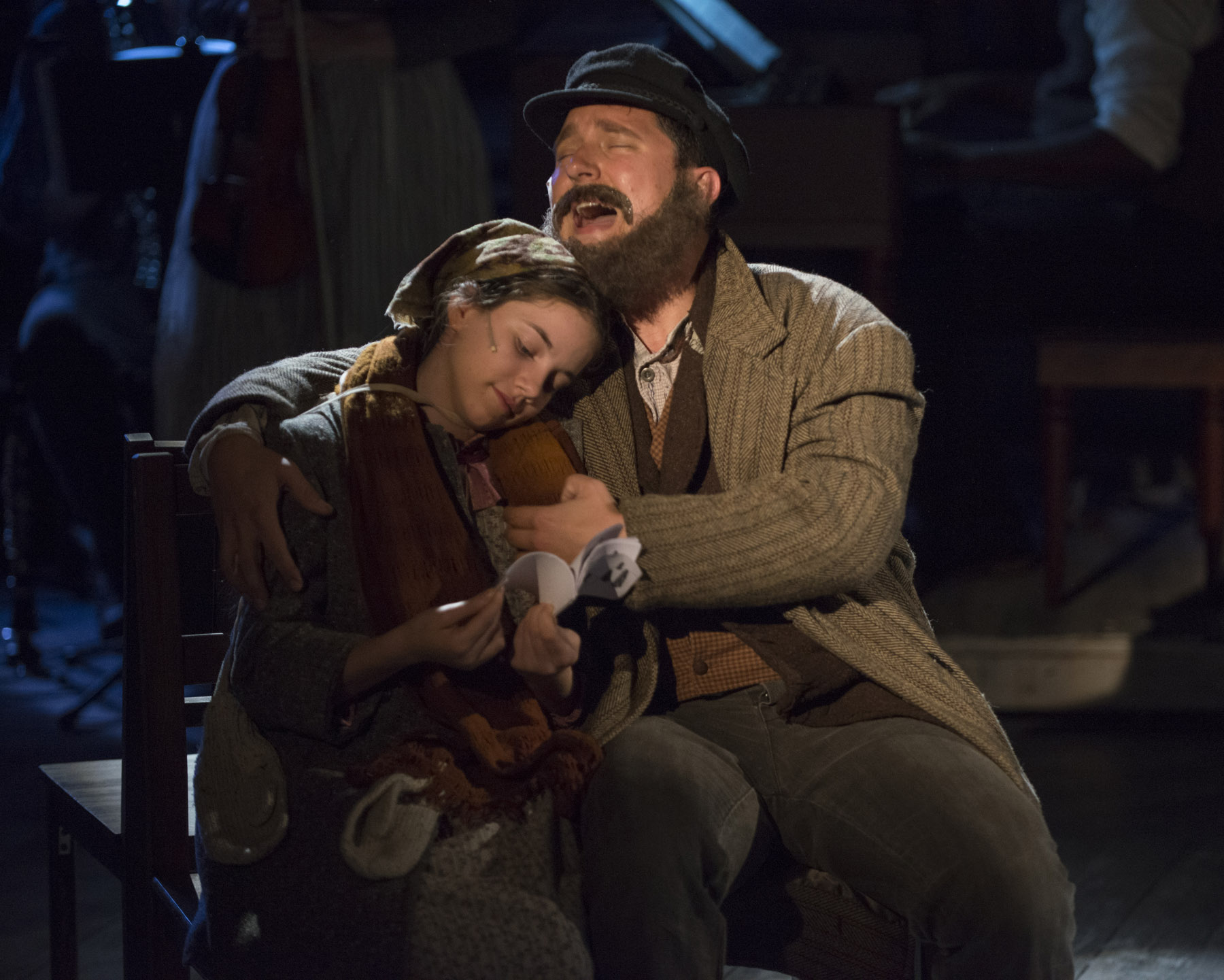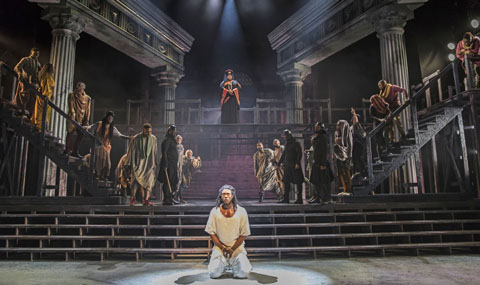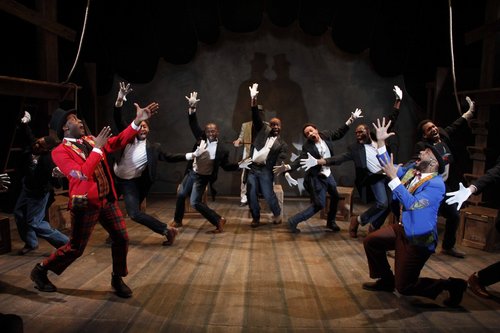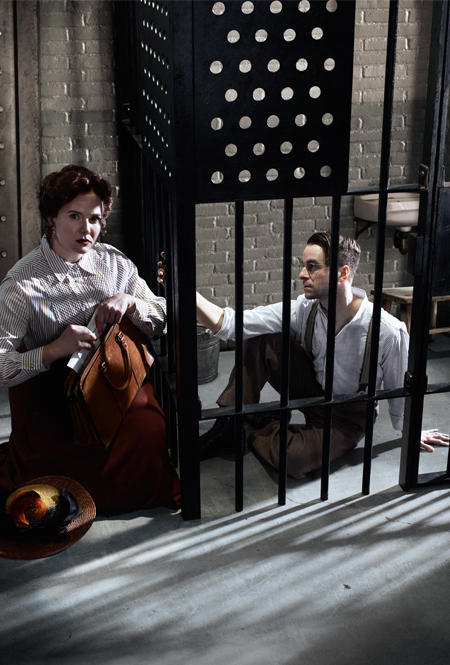DOES LIFE IMITATE ART?
A centuries old debate leads us to wonder if we are a product of the art we create or is art, in this case performance art, a true reflection of the world around us. After a closer look at a handful of recent musical theater offerings this season, the answer is a resounding yes ... and yes. Some reflection on these fine, insightful works is necessary. There is no doubt that if you saw all these productions, you too will be thinking a bit more earnestly about the immigrant experience and race relations in 20th century America and how it might apply to our lives today. Each producing organization deserves a healthy dose of respect for taking the artistic – and potentially commercial – risks to tell these important stories.
It comes as no surprise that it is all happening in and around Chicago. Our arts community has a reputation for risk and innovation. So, the conversation turns this week to the contributions of five musical theatre productions that have confronted racial bias, anti-Semitism and social injustice as a reflection of our society.
The Scottsboro Boys
Earlier this year, we spoke to James Earl Jones II who portrayed Hayward Patterson in Porchlight Music Theatre’s superb production of Kander and Ebb’s The Scottsboro Boys. This was the last production by director Samuel G. Roberson, Jr., a young and gifted theatre artist who passed on May 21, 2017 at 34 years old. Documented in extensive news reports of the day and many books, including an autobiography by Patterson, the story revolves around the fate of nine African American teenagers accused, tried and convicted of a crime they did not commit. The musical adaptation is framed in the style of a minstrel show by an all-black cast. The most poignant moments of this production were amplified because of the musical structure. The overall message of injustice is delivered by the silent and determined presence of Rosa Parks foreshadowing the social changes and civil rights movement that follow.
We have a deeper understanding of this story today because the central character, Haywood Patterson sentenced to life in prison and unwavering in his innocence, taught himself to read and then with the help of journalist Earl Conrad wrote Scottsboro Boy, published in 1950. As Jones tells us in our conversation, the minstrel show context is appropriate for the all-black cast for which the piece was written. With the ability to reflect months later, the Porchlight production of The Scottsboro Boys is one of the most powerful seen of late – a testament to the inspired talent and creativity of the cast and, especially, Roberson, whose bright and inspirational message casts a beacon of strength and perseverance.
Parade
The brilliantly conceived production of Parade currently playing through July 2nd at Writers Theatre in Glencoe is the story of Leo Max Frank, a factory superintendent who was convicted in 1913 of the murder of Mary Phagan, a 13-year-old employee. It is a rush-to-judgment story that ended in what is largely considered today a wrongful conviction. The love story/murder mystery, as seen through the political ambitions and deception of the principal characters, is told this time from the formal sitting and court rooms of Atlanta. After years of appeals and shifting public opinion, key witnesses recant their testimony, exposing the overwhelming prejudice of the day. This parade, however, then takes a very severe and tragic turn.
It is not hard to imagine all this happening because it did. Hal Prince produced the Broadway production that debuted in 1998 and received nine Tony Award nominations, winning Best Score (Jason Robert Brown) and Best Book (Alfred Urhy) and 13 Drama Desk nominations, winning six. A revival in 2009 also received seven Tony nominations. Urhy’s book, based on news reports and personal reflections, is the third part of his “Atlanta Trilogy” that includes Driving Miss Daisy and The Last Night of Ballyhoo. Parade is a particularly emotional heart-wrenching story of prejudice. And while the topic may not be at the top of your list for entertainment, the Writers Theater production should be. This is a musical that makes you think, feel and react to what is happening around us every day. It also highlights the importance of power, influence, factual reporting and the court of public opinion.
Jesus Christ Superstar
The critically acclaimed Jesus Christ Superstar, which recently finished its run at Paramount Theater, was bold and inspiring. This dynamic production took on new meaning with an all-black cast providing a highly-charged version of the driving musical score, framed in the story of Jesus of Nazareth, portrayed by Evan Tyrone Martin. In our conversation, Martin talked about his own spiritual roots and how that foundation influenced his interpretation of the work. Regardless of your religious affiliation, this production had something significant to offer. A powerfully performed, moving and unsettling depiction of a very familiar story.
Jesus Christ Superstar was a turning point in 20th century musical theater, coming at a time in the early 70’s when Hair and Godspell had already spoken to a new generation of audiences. First appearing as a musical concert album, a 1971 Broadway debut and run followed. Audiences were apprehensive about the treatment of this story in a staged musical version. It was only after the phenomenal world-wide success of the film version in 1973 that the iconic nature of Superstar was achieved.
The themes of persecution, betrayal, redemption and unconditional love were at the center of the superb Paramount production, a bold reimaging of a timeless story performed by an extremely talented company.
My Brother’s Keeper- The Story of the Nicholas Brothers
Jackie Taylor’s Black Ensemble Theater, the mission of which is to stamp out racism, mounted an exceptional original work about the Nicholas Brothers entitled My Brother’s Keeper – The Story of the Nicholas Brothers. In our conversation with writer, choreographer and star Rueben D. Ecoles (Harald Nicholas) and co-star Rashawn Thompson (Fayard Nicholas), early in the rehearsal process, we explored the challenges of recreating one of the most celebrated dance teams of the 20th century. Along the way, we began to understand the personal obstacles they faced in a career that spanned over five decades.
In production, the Ecoles/Thompson teamwork proved to be formidable and this was an inspiring piece of musical theater that we hope will find a life elsewhere. The Nicholas story is a natural for a larger musical theatre treatment, a true-to-life historical story including prominent characters of the day like Cab Calloway, Dorothy Dandridge and Bill “Bojangles” Robinson. Overcoming adversity and prejudice are key to the Nicholas Brothers story. (Note: Black Pearl: A Tribute to Josephine Baker is currently playing at Black Ensemble Theater.)
Ragtime
Griffin Theatre’s brilliant production of Ragtime, brings together all aspects of the American immigrant experience at the turn of the 20th century in a rich, diverse musical journey. Directed by Scott Weinstein, this larger-than-life production is raw, compelling, fresh, edgy and innovatively staged in the very intimate confines of the Den Theatre’s Heath Main Stage and is now playing through July 16th.
Based on a work of historical fiction by E. L. Doctorow published in 1975, Ragtime was adapted as a film in 1981 and debuted on Broadway in 1998 where it received 13 Tony nominations, winning four, but losing Best Musical to Disney’s The Lion King. A decade later, the revival on Broadway opened to critical acclaim in November 2009, but closed in early January 2010.
Perhaps it is a sign of the times, but this Ragtime seems more in step and has much more to say at this moment than perhaps at any other. This is the story of three families in the tapestry of our evolving cultural heritage. Mixed with real life characters like J. P. Morgan, Booker T. Washington, Evelyn Nesbit and Harry Houdini, the fictional characters of Coalhouse Walker, Jr., Sarah, their baby and a New Rochelle family remind us that our freedom was born from the resistance to racial prejudice and violence. The American dream is embodied in the poignant story of the Jewish immigrant Tetah and his young daughter whose vigilance and spirit is a central theme.
The challenges of these works speak directly to our ability to accept art that places us in uncomfortable territory, moves us, exposes our own bias and even threatens the essence of our perception of the American dream and spirit. In other words, in order to understand more about our interrelationships, we need look no further than our own musical theater community who is encouraging the conversation, and enlisting hundreds of talented, committed artists who view their responsibility to present meaningful and important work to expand our understanding of the world.
There are many more musical (and non-musical) works that could have been included in our conversation. Endorse the fine work of artists, actors and organizations who encourage us to explore issues outside of our comfort zone and, by doing so, help us to understand not only how far we have come, but also how far we have yet to go.
MORE INFORMATION | TICKETS
Parade -- Writers Theatre
Ragtime – Den Theatre
Pearl – Black Ensemble Theatre
Porchlight Music Theatre moving to Ruth Page Fall 2017 | Billy Elliot









